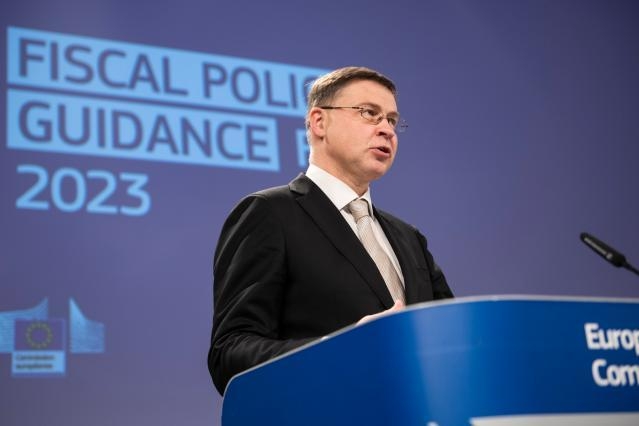Statement by Executive Vice-President Dombrovskis at the ECOFIN Press conference
 European Union, 2022
European Union, 2022Thank you minister, good afternoon everyone.
Today we had a rich discussion on the future of fiscal rules.
All EU economies are going through an intensely demanding period. As we know, pressures are coming from many sides: record-high inflation and energy supply issues, just to start with.
They are holding back growth and restricting room for policy manoeuvre. So it is important that we steer through the difficult period with the right policies and in a coordinated way.
Next year, fiscal policy needs to be prudent. It needs to prioritise fiscal sustainability and be consistent with the task of the ECB to reduce inflation.
At the same time, we need to help the people and companies that suffer most. So the support measures need to be well targeted and temporary.
This is important to contain budgetary impacts, considering the large scale of the shock and limited available means.
But we also need to make progress on reviewing the EU’s future economic governance framework.
Since we relaunched the discussions almost a year ago, we have identified some fundamental issues:
- making sure public debt is effectively declining, especially where it is high and also during good economic times.
- paying due attention to the composition and quality of public finances, given the current high investment needs for the twin green and digital transitions and our collective security.
- reducing complexity and improving compliance.
There seems to be broad convergence on these priorities.
So we are confident that we will be able to move forward on the basis of the orientations that the Commission will publish later in autumn.
Let me highlight a few elements.
Our first goal remains ensuring public debt sustainability. This will require fiscal adjustment, reforms as well as investments.
Those three elements should all be combined so as to achieve a realistic, gradual and sustained reduction in public debt ratios.
Second, given divergent debt levels across Member States, there cannot be a one-size-fits-all approach.
As we have outlined, there can be more leeway for Member States, but within a common set of rules.
Third, this leeway needs to be accompanied with stronger enforcement in case of non-compliance.
Finally, in terms of simplification, our surveillance should focus on a single observable indicator, like an expenditure benchmark.
We will discuss those elements in more detail once we put our orientations forward.
As I said, we are going through a demanding and difficult period. People and businesses need confidence in Europe’s economic stability.
This brings me back to taxation. We should focus on ensuring secure revenues for Member States, as we seek to protect the most vulnerable from the impact of the crisis.
At the same time, we need clear common rules to give EU businesses the legal certainty they need to prosper, invest and make the right strategic decisions in a stable environment.
In short: business-friendly taxation conditions that will help our businesses to grow.
For example, the EU has collectively agreed to implement the global minimum taxation agreement.
In business taxation, it should now be our top priority to make good on this commitment.
The Commission is committed to moving forward with implementing the agreement, and to work to find ways to do so.
This is important not only to maintain the EU’s credibility on its international agreements, but it is also a matter of fairness in these difficult times. Thank you.
